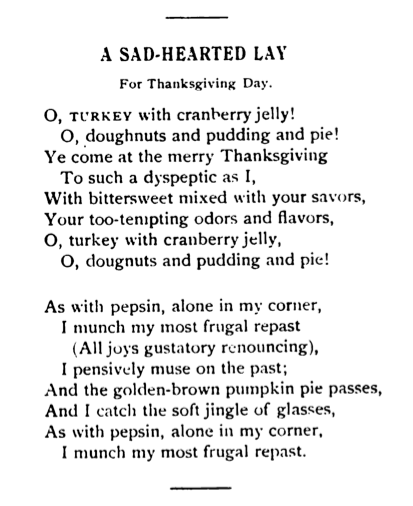Along with pilgrims, Native Americans, football, and, now, Black Friday sales, the turkey and its accompanying feast have long been centerpieces of American Thanksgiving iconography, figuring as the physical, gustatory reminders of American prosperity.
Yet, while many revelers serve up an extra slice of pumpkin pie, some reach for antacids, taken either prophylactically or in the aftermath of a rich meal. Indeed, our penchant for indulging on Thanksgiving – and overindulging – should make many of us doubly grateful for the miracle of modern antacids. What did people do before Tums, Pepcid AC, and Prilosec? As an 1894 poem suggests, they might’ve had to forgo the feast altogether.
“A Sad-Hearted Lay For Thanksgiving Day,” written by Edgarda Williams and published in the January 1894 issue of The Magazine of Poetry and Literary Review, tells the woes of one such individual who, stricken with habitual dyspepsia (heartburn and indigestion), must abstain from all of Thanksgiving’s “joys gustatory.”
As James W. Baker illustrates, many late-nineteenth and early-twentieth-century poems about Thanksgiving involve, for instance, the “dyspeptic nightmares suffered by greedy little boys.”¹ Here, the speaker sits alone and unsatisfied, remembering previous Thanksgiving meals while stomaching his/her own “frugal repast.” Pepsin, an ineffectual prototype of modern antacids, proves the speaker’s only digestive aid.²
When giving thanks this Thanksgiving, then, throw in a word for modern medicine and be grateful you’re not like this sad example from America’s past, sitting alone in a corner, perhaps eating bland potatoes and a crust of bread.
¹James W. Baker. Thanksgiving: The Biography of an American Holiday. Durham, NH: U of New Hampshire P, 2009. 121.
² Joseph S. Fruton. “A History of Pepsin and Related Enzymes.” Quarterly Review of Biology 77(2): 127-47.

